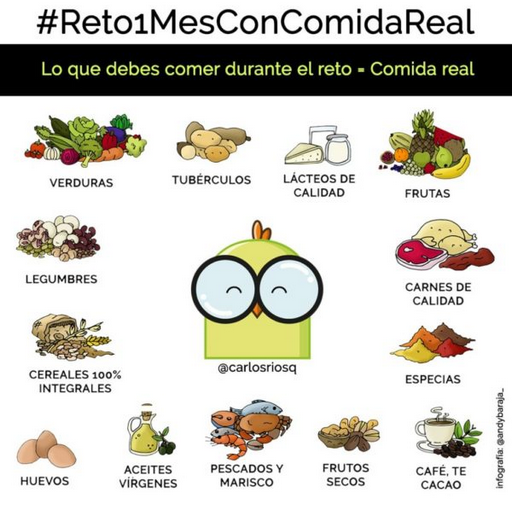The macrobiotic diet, dissociated, pineapple, onion soup, detox … are infinite diets that have become fashionable since the issues of food and nutrition began to interest me. And it’s not to start in a destructive way but none of them has convinced me from the point of view of a Dietitian-Nutritionist who has always believed in moderation and a balanced diet.
However, there is currently a movement in motion (notice that I say movement and not diet) that is changing my mind: the movement “Realfooding“. Of course, with some nuance.
According to Carlos Ríos, creator of the initiative, “Realfooding” is a lifestyle based on eating real food and avoiding ultra-processed ones. It aims to improve the health of the population through food.

And what is “Realfooding”? By real food is known all those minimally processed foods or whose industrial or artisanal processing has not worsened the quality of the composition or negatively interfered with their naturally occurring healthy properties. Specifically they are vegetables, fruits, nuts and seeds, tubers and roots, vegetables, fish and seafood, eggs, meat, whole grains, virgin oils, quality dairy products, coffee, cocoa and infusions, herbs and spices. Also considered as real food is the “good processed” which are those with an industrial or artisanal processing beneficial or innocuous for the quality of the food with respect to its healthful properties. The “good processed” are the second-range foods (real foods in canned and semi-preserved), third range (real frozen / deep-frozen foods), fourth range (real foods packed in modified atmospheres), fifth range (real cooked food dishes and vacuum packed).
The movement “Realfooding” is also based on avoiding ultra-processed foods, which include: soft drinks, energy drinks, packaged juices, sugary milk, pastries, white bread, processed meats, commercial and pre-cooked pizzas, cookies, refined grains and bars , chips and snacks, sweets and ice cream, diet products and commercial sauces.
The pillars on which the movement “Realfooding” is based are:
- The excess of overweight and obesity in the population
- To be healthy: Eat real food
- Real food does not focus on calories or nutrients, but on food
- Real food is cooked
- More market and less supermarket
- Real food does not have conflicts of interest
- Ultra-processed products are bad for your health
The “Realfooding” initiative encourages people to participate in #challengeamonthwithrealfood, which consists of being a month eating only real food and no ultra-processed food. In this way, the initiative aims to challenge the population to test how they feel by maintaining a healthy eating style. “Realfooding” makes available to the “Realfooders” a series of tools that help them meet the challenge, such as support teams in social networks where they can ask questions, tell their experiences, difficulties and achievements; publication of recipes with real food, etc. You can find all the information on its web.
“Realfooding” could mean the beginning of the change of eating habits that population needs to reduce the high rates of overweight and obesity that currently exist; for that reason it should not be left only in a temporary fad diet but in a practice that lasts over time; a fashion that has come to stay.
Obviously, this initiative does not mean that all lesson learned so far in terms of education campaigns in food and nutrition is useless, but is another tool. Therefore, if you intend to do the “Realfooding” challenge, remember the following keywords:
- Variety: In addition to choosing foods within the group of real food, these must be varied, that is, we can not always and only eat meat or rice or natural yogurt, however much it is real food.
- Balance: Our body needs nutrients in greater quantity than others and those nutrients are found in different amounts in food. This is the reason why some foods should be consumed more frequently than others. This reminds us of the famous balance diet pyramid of which we spoke in the previous post “malnutrition by excess”.
- Culinary technology: It is important to process the chosen foods correctly; for example, the potato is a vegetable considered real food, but better roasted or cooked than fried.
- Moderation: beware of the quantities! the fact that the eggs are real food, does not mean that it is beneficial to eat 3 eggs a day.
With respect to the food industry and the regulatory bodies in terms of food, nutrition and health, we must highlight the effort and investment made daily in the improvement of food safety, in the diversity of packaging, presentations and formats to maintain quality of these foods, more adapted to current society, in the creation of culinary alternatives for people with food intolerances and allergies, etc. However, there is still a long way to go in terms of improving the nutritional profile of food, the regulation of labeling, etc.
From CARTIF we congratulate the creators of “Realfooding” for the initiative and we support real food as the basis of a healthy, varied, balanced and moderate diet but always in the hands of the food industry and the regulatory bodies, who every day work and invest to give food products of higher quality and safety to all population groups.
- From waste to resource: how to give food by-products a second life. - 26 September 2025
- We´ve done it again: A new product on the market! - 31 January 2025
- You can also consume locally - 14 June 2024
